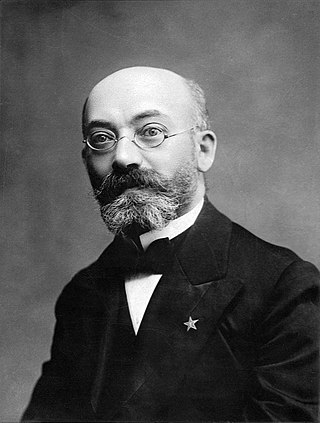
L. L. Zamenhof was an ophthalmologist who lived for most of his life in Warsaw. He is best known as the creator of Esperanto, the most widely used constructed international auxiliary language.
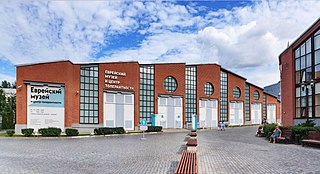
The history of the Jews in Russia and areas historically connected with it goes back at least 1,500 years. Jews in Russia have historically constituted a large religious and ethnic diaspora; the Russian Empire at one time hosted the largest population of Jews in the world. Within these territories, the primarily Ashkenazi Jewish communities of many different areas flourished and developed many of modern Judaism's most distinctive theological and cultural traditions, while also facing periods of antisemitic discriminatory policies and persecution, including violent pogroms. Some have described a "renaissance" in the Jewish community inside Russia since the beginning of the 21st century; however, the Russian Jewish population has experienced precipitous decline since the dissolution of the USSR which continues to this day, although it is still among the largest in Europe.

Beshankovichy is a town in Vitebsk Region, Belarus, and a port on the Western Dvina. It is located 51 km (31.69 mi) west of Vitebsk on the railway line between Orsha and Lyepyel. The population is 6,647 (2017).
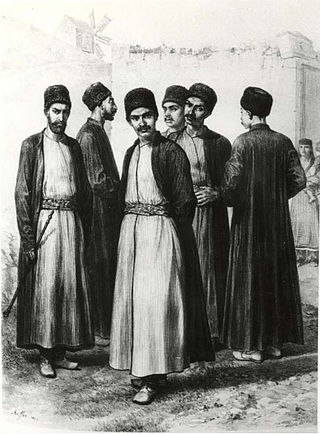
The Crimean Karaites or Krymkaraylar, also known as Karaims and Qarays, are an ethnicity of Turkic-speaking adherents of Karaite Judaism in Central and Eastern Europe, especially in the territory of the old Polish-Lithuanian Commonwealth and Crimea. "Karaim" is a Russian, Ukrainian, Belarusian, Polish and Lithuanian name for the community.

The Social Democracy of the Kingdom of Poland and Lithuania, Lithuanian: Lenkijos karalystės ir Lietuvos socialdemokratija, LKLSD), originally the Social Democracy of the Kingdom of Poland (SDKP), was a Marxist political party founded in 1893 and later served as an autonomous section of the Russian Social Democratic Labour Party. It later merged into the Communist Workers Party of Poland. Its most famous member was Rosa Luxemburg.

Horace Günzburg, 2nd Baron Günzburg, was a Russian philanthropist.

Zorach or Zorah Wahrhaftig, also known as Zerach Warhaftig, was an Israeli rabbi, lawyer, and politician. He was a signatory of Israel's Declaration of Independence.
In the history of Lithuania, the Council of Lithuania, after July 11, 1918, the State Council of Lithuania was convened at the Vilnius Conference that took place between 18 and 23 September 1917. The twenty men who composed the council at first were of different ages, social status, professions, and political affiliations. The council was granted the executive authority of the Lithuanian people and was entrusted to establish an independent Lithuanian state. On 16 February 1918, the members of the council signed the Act of Independence of Lithuania and declared Lithuania an independent state based on democratic principles. 16 February is celebrated as Lithuania's State Restoration Day. The council managed to establish the proclamation of independence despite the presence of German troops in the country until the autumn of 1918. By the spring of 1919, the council had almost doubled in size. The council continued its efforts until the Constituent Assembly of Lithuania first met on 15 May 1920.
Julius Davidovich Brutzkus or Judah Loeb Brutzkus or Joselis Bruckus was a Lithuanian Jewish historian, scholar, and politician, and one of the leaders of Zionist movement in Russian Empire.
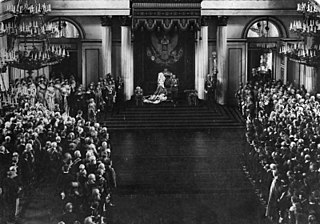
Legislative elections were held in the Russian Empire from 26 March to 20 April 1906. At stake were the 497 seats in the State Duma of the Russian Empire, the legislative assembly. Election for the First State Duma, which only ran from 27 April to 8 July (O.S.) 1906, returned a significant bloc of moderate socialists and two liberal parties which demanded further reforms. For this reason, it is sometimes called the Duma of Public Anger.

Gottfried Erik Fuchs (also Godfrey Fuchs; was a German Olympic footballer. He scored a then-world record 10 goals for the Germany national football team in a 16–0 win against Russia at the 1912 Olympics. He left Germany to escape the Holocaust, as he was Jewish, and ultimately emigrated to Canada.
ORT, also known as the Organisation for Rehabilitation through Training, is a global education network driven by Jewish values. It promotes education and training in communities worldwide. Its activities throughout its history have spanned more than 100 countries and five continents. It was founded in 1880 in Saint Petersburg to provide professional and vocational training for young Jews.

Bramson ORT College was a nonprofit private two-year college in New York City. Its main campus was located in Forest Hills, Queens, with a satellite campus in Brooklyn. It was affiliated with ORT America, a volunteer organization that is the umbrella organization of ORT in the United States, and World ORT, the parent nonprofit global Jewish organization that promotes education and training in over 100 countries. Founded in 1979, the institution closed in January 2017.

Jakub Wygodzki was a Polish–Lithuanian Jewish politician, Zionist activist and a medical doctor. He was one of the most prominent Jewish activists in Vilnius. Educated as a doctor in Russia and Western Europe, he established his gynecology and pediatric practice in 1884. In 1905, he was one of the founding members of the Constitutional Democratic Party (Kadets) in Vilnius Region. In 1918, he was co-opted to the Council of Lithuania and briefly served as the first Lithuanian Minister for Jewish Affairs. After Vilnius was captured by Poland, Wygodzki was elected to the Polish parliament (Sejm) in 1922 and 1928. He died in the Lukiškės Prison during the first months of the German occupation of Lithuania during World War II.

The "Bund" in Latvia was a Jewish socialist party in Latvia between the two World Wars, adhering to the political line of the General Jewish Labour Bund.
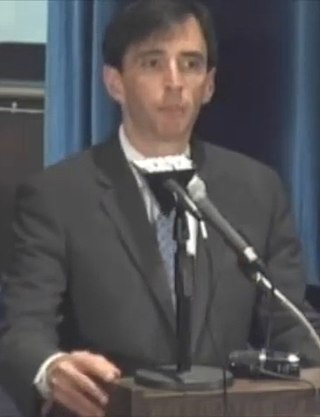
Noam Bramson is an American politician from the state of New York. He is the mayor of New Rochelle, New York, and has served since being appointed in January 2006 to complete the unexpired term of Mayor Timothy C. Idoni. Bramson was reelected in 2011 with 79% of the vote.

The General Jewish Labour Bund in Lithuania, Poland and Russia, generally called The Bund or the Jewish Labour Bund, was a secular Jewish socialist party initially formed in the Russian Empire and active between 1897 and 1920. In 1917 the Bund organizations in Poland seceded from the Russian Bund and created a new Polish General Jewish Labour Bund which continued to operate in Poland in the years between the two world wars. The majority faction of the Russian Bund was dissolved in 1921 and incorporated into the Communist Party. Other remnants of the Bund endured in various countries. A member of the Bund was called a Bundist.
Bramson is a surname. Notable people with the surname include:

"Papirosn" is a Yiddish song that was written in the 1920s. The song tells the story of a Jewish boy who sells cigarettes to survive on the streets. He depicts his tragic fate; having lost his parents, his younger sister has died on the bench, and eventually he loses his own hope.
David Lvovich (1882-1950), known by the pseudonym Davidovich, was a Russian-Jewish politician. Lvovich was one of the main leaders of the Zionist Socialist Workers Party (SS).















